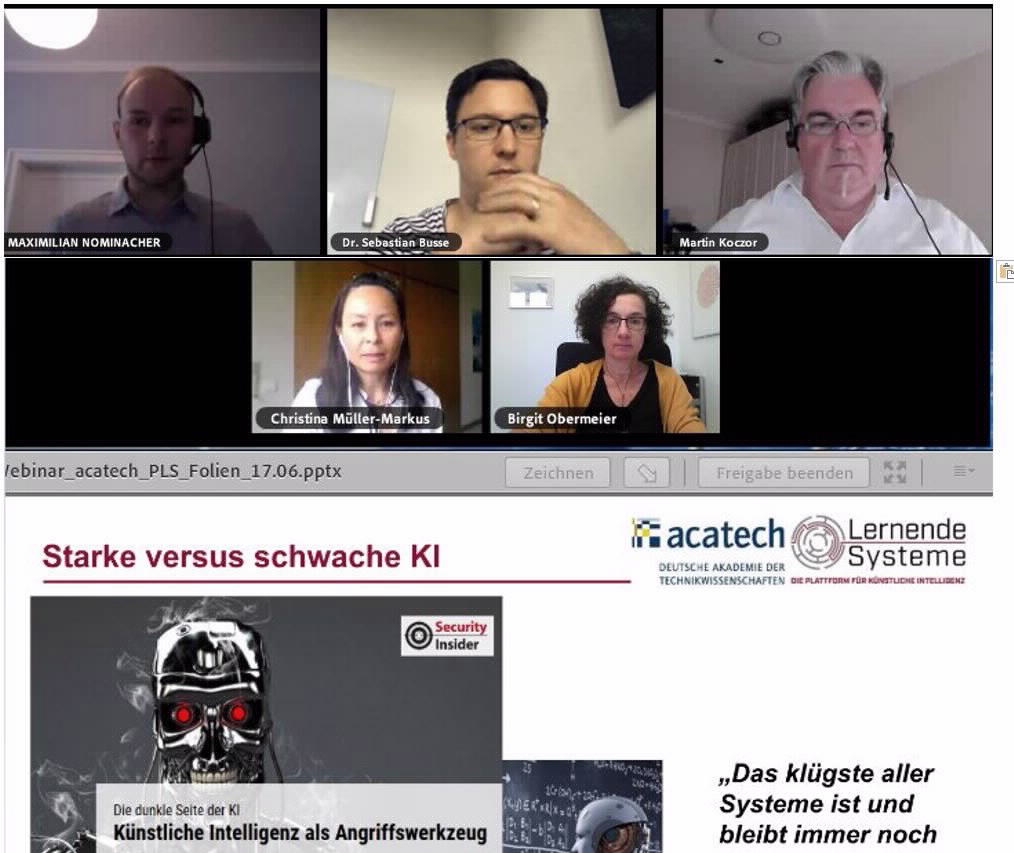What is, can and may Artificial Intelligence? – Advanced training for teachers on Digital Day 2020

Munich, 23 June 2020
Artificial Intelligence (AI) has long since arrived in the everyday lives of many people – whether in the form of intelligent recommendation systems, translation aids or navigation devices. But what is AI anyway, what developments and applications can be expected and what questions does this raise for society – in general and specifically in the use of AI in healthcare? On the occasion of the nationwide Digital Day on June 19, the Plattform Lernende Systeme, acatech and the Bayerische Landeszentrale für politische Bildungsarbeit invited to a virtual advanced training for teachers on the topic of AI.
Artificial intelligence is a topic for teaching: Many students are very interested in the current technological developments and the ethical questions associated with them, according to the tenor of the webtalk, which was attended by around 80 teachers from grammar schools, technical and vocational colleges as well as vocational and secondary schools. The teachers confirmed that it is helpful to obtain knowledge and impulses concerning fields of application, opportunities and risks in the use of AI in order to discuss the topic.
What distinguishes intelligent algorithms, how AI has developed since its beginnings in the 1950s and where it is already used today in the form of speech recognition, robotics or data analysis, was outlined by Christina Müller-Markus (acatech HORIZONTE) and Birgit Obermeier (Plattform Lernende Systeme) in their introductory talk. Using the application scenario With Artificial Intelligence against cancer developed by the Plattform Lernende Systeme, they gave an outlook on how AI-based assistance systems could improve the diagnosis and treatment of cancer in the medium term. Furthermore, they showed which questions concerning data protection, discrimination, liability, transparency and a changed working environment arise in the context of AI.
How and who does AI support in medicine?
The subsequent expert talk highlighted different perspectives on the use of AI in medicine. Sebastian Busse, founder of the AI start-up NEXT Data Service AG, showed in his impulse how the complex planning of operations can be optimized with the help of AI. The intelligent use of data promises more efficient processes in emergencies or personnel bottlenecks, but also creates new transparency – for example about the way surgeons work.
Martin Koczor, Managing Director of the German Federal Association of Kidney Diseases (Bundesverband Niere e.V.), also underlined the opportunities offered by increasingly digitalised medicine: “Intelligent matching makes it possible to identify suitable donor organs for organ transplants faster and better. At the same time, patients must always retain control of their data. Data protection and transparency were also the focus of the subsequent chat between teachers and experts, which was moderated by Maximilian Nominacher, a speaker from the Bayerische Landeszentrale für politische Bildungsarbeit.
Teaching unit on Artificial Intelligence
A teaching unit on AI presented in the event is permanently available to teachers from Bavaria on the MEBIS learning platform. The teaching unit for secondary level I and II was developed by the Bayerische Landeszentrale für politische Bildungsarbeit using materials from the Plattform Lernende Systeme.
With the virtual advanced training for teachers, acatech, the Plattform Lernende Systeme and the Bayerische Landeszentrale für politische Bildungsarbeit jointly participated in the first nationwide Digital Day, which was initiated by the “Digital for All” initiative. With the aim of promoting digital participation in Germany, more than 1,000 campaigns for different target groups on various aspects of digitization took place nationwide on June 19.



